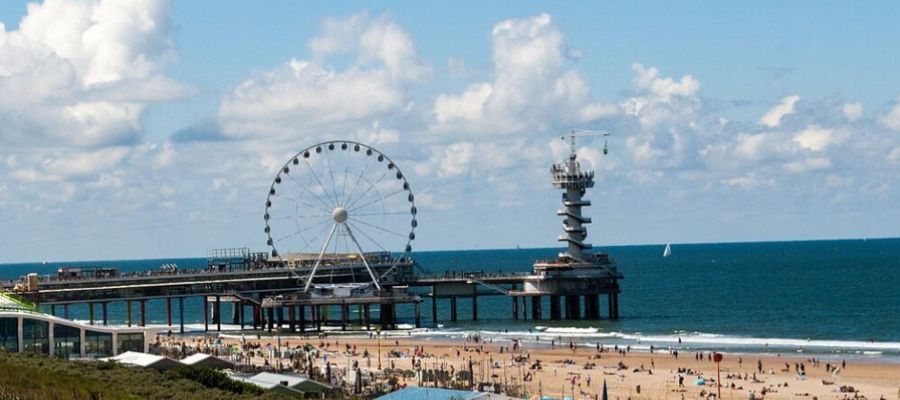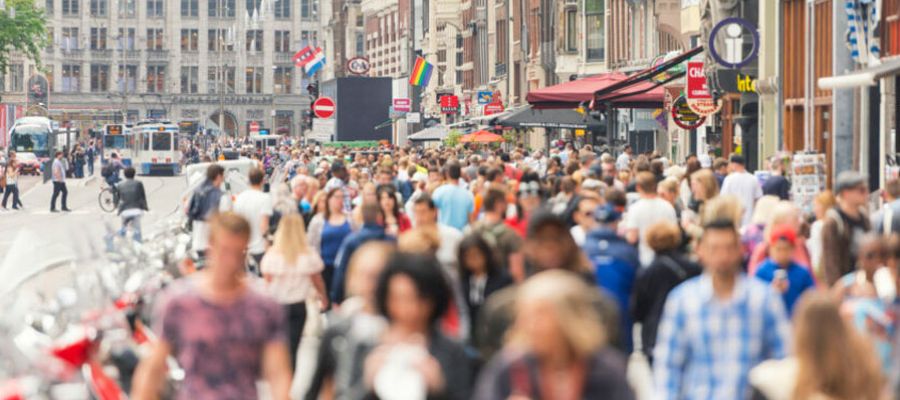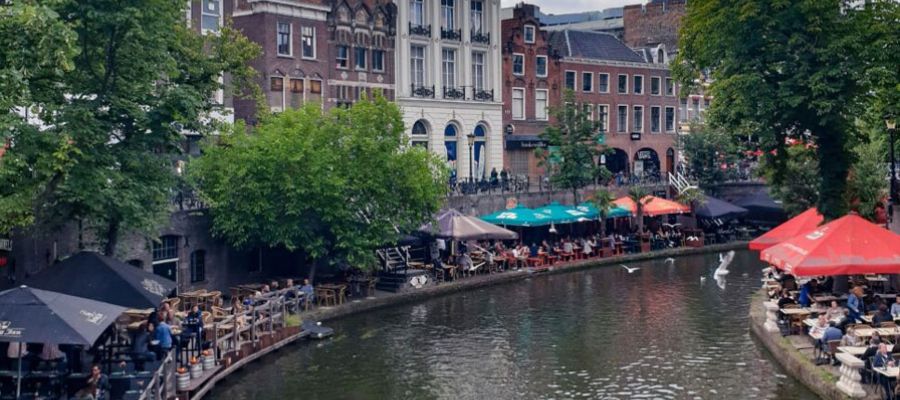Contact
Bureau RMC
Marnixkade 109F
1015 ZL Amsterdam


Women Bare, Trade Bare
The notion of "women bare, trade bare" is a thing of the past. Today, ideal weather conditions with more sunshine hours are more decisive for city center visits than special sales events like Black Friday, shopping Sundays, or shopping evenings. This is roughly the conclusion from the visitor data collected by Bureau RMC over the first six months of this year.
For years, Huib Lubbers of Bureau RMC has emphasized that municipalities should focus not only on a diverse retail offering but also on providing ample entertainment for their city centers. He’s never seen this trend so strongly reflected in the figures as in the first six months of this year. Climate change, it seems, is not just happening on a global scale, but also in the shopping streets.
"Old mechanisms no longer work," says Lubbers. "January used to be a good shopping month with all the sales. In March, people would go on the hunt for new furniture and spring clothing. That effect hardly exists anymore. Even special events like Black Friday are losing their significance. The city center is becoming a place for entertainment, where after shopping, people want to sit on a terrace in the sun."
Impulses
Let’s first address the underlying question. Was there a direct reason to conduct this research?
Huib Lubbers: "Research into shopper behavior in shopping streets and stores is one of our core topics. With our CityTraffic method, we always measure how many visitors there are in a shopping area and shopping street. Recently, I’ve noticed that peak footfall in shopping streets isn’t so much caused by retail activities but rather by events like King's Day or Liberation Day. These are more important impulses for shopping street visits than traditional peaks like clearance sales, shopping evenings, Saturdays, or Sundays.
What also plays a role here is the history of the COVID period. In January 2022, stores still had to deal with restrictive measures, such as the closure of non-essential stores. We expected a more positive outcome at the beginning of this year. But no, the first three months were actually worse than last year. The reason for that was the weather. The first three months of this year were cold and rainy. It simply wasn’t nice shopping weather."
Are there reasons why traditional retail peaks are less effective than before?
"There are no longer any traditionally strong moments that captivate shoppers. The ‘Three Crazy Days’ at De Bijenkorf was one such moment, as was the Price Circus at V&D. We’ve said goodbye to that long ago. And sales in general: no one in the Netherlands knows anymore when the sale starts or ends. In Belgium, it’s different. There, the start and end dates are precisely defined by legislation. In the Netherlands, there were no rules regarding sale periods. There used to be a kind of underlying custom: non-food stores would start the sale period at the end of June, beginning of July. You don’t see that anymore. Sales have become a structural activity. There are no more collective sales moments, it has become a solitary, store-driven activity."
What about events like Halloween or Valentine’s Day? Aren’t these collective moments?
"Well, they never really had much impact. The same goes for moments like Black Friday, especially when combined with the Saturday and Sunday following. They were significant sales events. Nowadays, though, an event like Green Friday is surprisingly gaining popularity, where participating companies work on planting trees through sustainable forest projects. Companies like Dille & Kamille, Decathlon, Innocent, ANWB, and Intratuin are now participating.
And then there’s Christmas: for me, this is the clearest example of this trend. Between Saint Nicholas and Christmas used to be the busiest time of the year. The belief was that retailers made their revenue until December 10, and then started making profits afterward. This extreme busyness is no longer there. Yes, it’s busy at the end of the year, but not as much as before. The same goes for the autumn holidays, spring break, and even Black Friday. Shopping evenings, Sunday footfall—it’s all much flatter now. Sunday is still a good shopping day, but it seems to have peaked."
Does this mean that people are no longer tempted by traditional retail moments?
"People are increasingly making a conscious decision to go to the shopping street. People shop online in large numbers and prepare their shopping online. When people choose to come to the physical store, they have a clearly defined purpose and spend more money compared to an unplanned shopping visit. Fewer people are coming to the shopping street than before, but what’s counterbalanced is that they know what they want and spend more money. This actually benefits retailers' productivity."
Weather Conditions
What Bureau RMC brings to the forefront in this research is that weather conditions are much more of a determining factor for city center visits than special sales events. 2023 initially seemed like a disastrous year for city centers, but due to the above-average spring weather in May and June, the decline in footfall was limited to -2.5%. In early May 2023, spring broke through, and visit numbers increased accordingly. "Up to about 32 degrees, because after that, it becomes less pleasant for shopping."
"Women Bare, Trade Bare"—Does this assumption still hold?
"At 27 degrees, it’s certainly nice to lie on the beach. But when it gets truly tropical, it’s not pleasant weather for shopping. More and more stores have air conditioning. At high temperatures, you’re actually walking from air conditioning to air conditioning. Perhaps, in the future, people will simply accept the high temperatures and still go shopping, just like in the warmer southern parts of Europe. After all, stores are nice and cool!"
In your press release, you raised the question: Does this mean the modern shopper wants to shop but also sit on a terrace?
"The modern shopper is better prepared. They don’t need to go in and out of stores to find the right size jeans. The fun shopping traditionally done on shopping evenings or Saturdays has become more efficient. You can reach your goal faster. If you want to find entertainment, you don't just wander the shopping street but combine it with activities like sitting at a terrace or other forms of recreational stays.
This is nothing new. We’ve called it recreational shopping for fifteen years. It seems this trend is gaining more and more ground. When people go to the city center, they’re not just going to shop.
All in all, it’s a bit dangerous to draw a final conclusion. And yet: the idea seems justified that higher temperatures are a more significant motivation to visit the city center than special sales events. I haven’t specifically researched this, but it seems logical. What you can learn from this is that the city center is no longer a shopping paradise but rather a space where people look for entertainment."
Temptation
The key question, of course, is: What should retailers do with this?
"Whether you sell fashion, shoes, or brown and white goods, I see that various formats are doing less discounting than before. Consumers will still come, especially now that the popularity of online shopping is under pressure. Our motto used to be: 'Give oats to the running horses,' meaning that when consumers are willing to go to the store, you should also have your promotions ready. Don’t advertise out of sync.
January is an important clearance month, but when it’s cold and dreary, consumers stay home. Maybe retailers should focus their promotions more on months when the weather is more pleasant for shopping, such as March, April, or May. When consumers come to the shopping street, try to entice them into making a purchase at your store instead of at the competitor’s. What I also want to say: shopping Sundays, Saturdays, and shopping evenings may no longer be peak moments, but don’t strike them off the calendar either. Consumers still show that they come when it suits them."
Finally, about the weather: Is it wise to tailor your assortment to it? The higher the temperature, the more emphasis on fans and air conditioners?
"This is also a theme from recent times. Everyone looks for an air conditioner when it gets hot. There’s definitely an assortment shift in this regard, but what I find remarkable is that trade seems less price-driven than five years ago. In the past, you could pick up a TV on a mega-discount every week. You see much less of that now. Apparently, shoppers are showing less price-driven behavior. People are becoming more conscious shoppers, showing less impulse-driven behavior. A sales event like clearance no longer has the power it once had."

Vestigingsplaatsonderzoek om potentie nieuwe locaties Street Jump te bepalen Vestigingsplaatsonderzoek.
Vestigingsplaatsonderzoek om potentie nieuwe locaties Street Jump te bepalen Vestigingsplaatsonderzoek.
Vestigingsplaatsonderzoek om potentie nieuwe locaties Street Jump te bepalen Vestigingsplaatsonderzoek.
Vestigingsplaatsonderzoek om potentie nieuwe locaties Street Jump te bepalen Vestigingsplaatsonderzoek.
Vestigingsplaatsonderzoek om potentie nieuwe locaties Street Jump te bepalen Vestigingsplaatsonderzoek.
What are others saying?
As an alderman, I like to be assisted by knowledgeable people. In the retail field, Bureau RMC does just that, including developing the retail vision. RMC painted a realistic picture. I was also very impressed by the way they led an information evening for all retailers in Alphen.
Alderman for Economic Affairs of the Municipality of Alphen aan den Rijn
RMC has been helping us for years to keep a finger on the pulse of retail in the Netherlands. Their data and reports align perfectly with our needs as a data-driven company.
Head of Market Insights, Vodafone Libertel B.V.
The cooperation with Bureau RMC is pleasant, constructive and solution-oriented.
Strategic Advisor Economic Affairs for the Municipality of Alkmaar









What are others saying?
As an alderman, I like to be assisted by knowledgeable people. In the retail field, Bureau RMC does just that, including developing the retail vision. RMC painted a realistic picture. I was also very impressed by the way they led an information evening for all retailers in Alphen.
Alderman for Economic Affairs of the Municipality of Alphen aan den Rijn
RMC has been helping us for years to keep a finger on the pulse of retail in the Netherlands. Their data and reports align perfectly with our needs as a data-driven company.
Head of Market Insights, Vodafone Libertel B.V.
The cooperation with Bureau RMC is pleasant, constructive and solution-oriented.
Strategic Advisor Economic Affairs for the Municipality of Alkmaar









info@rmc.nl
Bureau RMC
Marnixkade 109F
1015 ZL Amsterdam

Powered by © Totoweb and Gonta Creative Agency
RMC is part of MotivactionPowered by © Totoweb and Gonta Creative Agency




